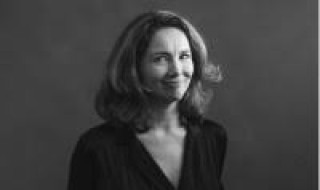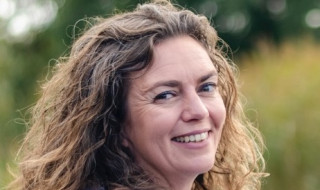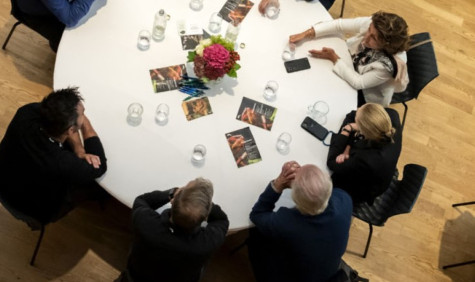A new year to think tank
Think Tank Digital Transition AI Part 2
The first year of the think tank was dominated by exploration of AI in education and research. This exploration was necessary, because a lot is already happening in the ecosystem. The result is an overview of AI initiatives and projects in Dutch education and research.
The dates for the Think Tank 2026 meetings have been announced! Wednesday, April 1, 5:00 p.m. to 9:00 p.m., Wednesday, May 6, 5:00 p.m. to 9:00 p.m., and Wednesday, September 2, 5:00 p.m. to 9:00 p.m. Instructions for administrators on how to register can be found at the bottom of this article.
In addition to this overview, many interconnections were made and there will be a follow-up. Because with a digital transition like AI, you are not ready in one year. SURF Magazine talks to two administrators who are pushing hard for administrative cooperation on this topic.
Head group member of the year 2025 Mirjam Koster and newly appointed head group member for the year 2026 Anneke Luijten-Lub talk about what the think tank has brought them and what they expect.
For the expansion of the think tank's thinking, Mirjam Koster is happy to hand over her baton as a member of the leading group. "I continue to follow with interest what the next group does and am on the edge of my seat when there is another feedback."

Mirjam Koster-Wentink
At the 3rd and final meeting of the Think Tank 2025, an overview of projects and initiatives already in place was on the table. "We are further along than a year ago. There was really no such overview at the start. Now there is a nice overview that I expect to be further enriched in the coming year."
The AI transition is sometimes compared to the industrial revolution. So too in the think tank: you can't stop it if someone builds a steam locomotive themselves. At the same time, resources and time are limited. Then it is super smart to work together. "With SURF, we have a cooperative, which I think is a very smart vehicle to use in this transition."
Guide country
There are many questions surrounding AI in Dutch education and research, and there is an explanation for this. In Digital Decade, a report by the European Commission, the Netherlands is named as one of the guiding countries in Europe when it comes to this digital transition.
Mirjam: "As a guiding country, we are relatively ahead and at the same time we don't yet know everything. The environment is constantly changing. We encounter questions and issues earlier than others and these in turn raise more questions and unrest." But that is part of being at the forefront. She warns, "The tendency to run faster and faster ahead as a guide does not help. Better to keep wondering and amazed. And above all, stay calm, because if you don't, the rest behind you will become even more restless."
"It was a very inspiring year, both the content we were given as directors and the mutual sharpening of minds. The different perspectives, knowledge levels and backgrounds created a very nice conversation, which was also fuelled by a speaker, lecture or model. This allowed us to explore further. You find new questions you didn't know before. And that is exactly what is needed if you set yourself up to work on this huge transition that is going on."

Anneke Luijten-Lub
When it comes to opportunities and challenges, institutions often run into the same thing, notes Anneke Luijten-Lub. She is joining the think tank's leading group this year. "For this digital transition, and everything that is coming at our institutions with it, I think it is necessary for us as administrators to exchange experiences," she says.
"And besides, with so many people together, there is almost always someone who has an idea for a solution," she adds.
"The great thing about the think tank is that we are fed by the knowledge of experts from different institutions. SURF brings those together. It's very nice that we are handed such a great programme. The AI transition is an extremely complex whole, when you start turning something everything starts moving. Factors affect each other, we call this interplay system dynamics, which we have visualised in a so-called causal loop diagram.
Concrete
For the coming think tank year, Anneke hopes it will be even more concrete: how will the transition affect us and what do we have to do? In short, tools on what to think about as a director when shaping the digital transition in your institution. An action plan for 2026 is already in the works.
"There is a lot of openness among ourselves and that is valuable. We exchange what we have done and what the experiences are. For example, how have you adapted your testing policy to AI? An AI business case came along with not only the AI application, but also the calculated time savings per colleague. Then you can learn how that was handled and what you can copy. Or institutions that are already much further along in awareness and training of their people, what did it take to do that?"
The advent of AI is of a totally different order than the introduction of ICT in education. There is much consensus on that. "AI can impact your institution on so many different fronts: the way you teach; the professions we train for; the quality of research; all the way to business processes. And again, AI is moving faster than you think."
The Digital Transition Think Tank meets three times a year. A gift, according to the director. "The meetings are always on the edges. In the day-to-day, you don't always take the peace to delve into these kinds of transitions. In the think tank, there is the exchange with each other in relative peace, which I find very pleasant."
Get involved!
The Digital Transition Think Tank is facilitating the strategic conversation with three live meetings, The dates for the Think Tank 2026 meetings are: Wednesday, April 1, 5:00 p.m. to 9:00 p.m., Wednesday, May 6, 5:00 p.m. to 9:00 p.m., and Wednesday, September 2, 5:00 p.m. to 9:00 p.m. . This is the second think tank year organising in-depth discussions within the pressing topic of AI between Summit 2025 and Summit 2026.
Directors wishing to participate in the Think Tank can apply via Ron August.
The 2026 leading group consists of Arlène Denissen (Avans), Hester Bijl (Leiden University), Gaby Allard (ROC van Amsterdam-Flevoland) and Anneke Luijten-Lub (Van Hall Larenstein). They succeed the leading group 2025, which consisted of directors Pauline Satter (Christelijke Onderwijs Groep Vallei & Gelderland-Midden), Hans Nederlof (De Haagse Hogeschool), Mirjam Koster (Graafschap College) and Peter-Paul Verbeek (University of Amsterdam).
"I look forward to strategically exploring again with directors what the digital transition requires of us. It is precisely in these conversations that the strength of the cooperative lies: reflecting together, finding direction and keeping the gaze forward."
